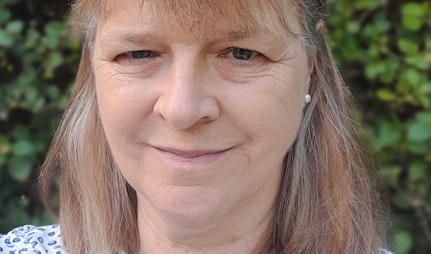Kingdom Relationships
The story of Onesimus and Philemon in the book of Philemon challenges us to see things from a kingdom perspective and consider the question how am I captive to thinking and ways of relating to people that is informed more by society than by Christ?
Posted on 28 July 2025 by Jill Marrs


Freedom and captivity
Across the savannahs of Africa impala run free, skipping between watering holes and grazing in the shade of acacia trees. This is their normal habitat, where they can most fully express the characteristics of their unique make up, they leap - up to 10 feet in the air and 30 feet forward. They are nature’s great leapers.
If you cannot visit the savannah to see impala, you might find them in a zoo. Here you will get a good view for only a low barrier is needed to keep them in. They neither jump high nor jump long. Their natural ability and behaviour are restricted, not by the barrier which they could easily jump but by the fact that they will not jump if they cannot see where to land. And so, they are kept captive by the limit of their vision.
With that picture in mind let us consider the story of Onesimus and Philemon as found in the book of Philemon.
The Captives
There are three people associated with this letter, Paul - the main writer of the letter, Philemon – the main recipient, though it is to be read by others too, and Onesimus who the letter is largely about. All three of them are Christians, but all 3 are limited in expressing their faith because of captivity. They are all captives of the Roman Empire in different ways.
Paul is physically bound, held as a prisoner possibly in Rome. Yet he can see beyond the restrictions of his captivity. His captivity has not restricted his vision. He has a vision of the Kingdom of Christ. A kingdom he preaches and writes about passionately, the Kingdom of his true master, the servant Christ.
Philemon who the letter is addressed to is a free man who lives in Colossae. He is wealthy, the head of a household with slaves. They contribute to his economic wealth and his household’s comfort; they are free labour for him to use as he pleases. They are the machinery that enables his life to function smoothly with minimal cost.
He is a Christian and a church meets in his home. He knows Paul, he possibly met him in Ephesus. He uses the blessings of his wealth for the Kingdom. He is a good man.
Despite his power, wealth and faith, he cannot see beyond the Roman system of which he is a beneficiary. There are limits to his vision, boundaries in his view of the Kingdom. He too is a captive. He cannot see how his power and privilege, while blessing his life are destructive to others. He can be misled to think his worth is related to the system and his place in it. It defines his relationships, who he can befriend, who he can learn from, and blinds him to the humanity, the image of God and true value of those who live as slaves.
Onesimus is not a free man but a slave who is owned by Philemon. Even if Philemon is a kinder master because he is a Christian, Onesimus is shackled to a system that robs him of humanity, worth, dignity, freedom, and opportunity. It is physically demanding without rest or reward. Philemon escapes, he leaves the life-limiting bondage of being a household slave and now faces the risks of life as a slave on the run, with little resources and no knowledge of how to act as if free. He makes the journey to Rome, possibly overland, a journey of over 1000 miles, and somehow manages to connect with the imprisoned Paul. Through the ministry of Paul, Onesimus becomes a Christian, he is discipled in faith by Paul and restored in his humanity and sense of worth. He is no slave to Paul but a caring son.
The Challenge
Now Paul has a problem. Both Philemon and Onesimus are Christians, and therefore children of God, brothers in Christ. Their Kingdom identity is a family identity.
But they are also defined by the system of slaves and free, which is an immovable part of the fabric of society, of how the Roman Empire works. They are both held captive to this system.
Paul has options – Perhaps the easy option is for Paul to plead for Onesimus’ freedom, for manumission and then keep him with him, that would avoid a lot of awkwardness. Perhaps there could be churches for slaves and former slaves, and then churches for masters – keep things homogenous and avoid the challenge of bringing very disparate people together. Keep the Kingdom in line with the system.
Or
He could organise for Onesimus to return to Philemon’s household, to remain as a slave, but maybe with greater kindness from Philemon. But this would also be to align the ways of the Kingdom with the ways of the world.
Or, he could do something radical.
The Kingdom of Christ
Paul writes in Gal. 3: 28, “There is neither Jew nor Greek, there is neither slave nor free, there is neither male nor female; for you are all one in Christ Jesus.”
It is level ground at the foot of the cross. In the Kingdom people are no longer defined by the roles and impositions of empire. So here in this letter Paul proposes that Philemon and Onesimus take a large leap and he shows them where they will land.
They will both leave the restrictions of empire relationships and enter a kingdom relationship where Onesimus is no longer a slave and Philemon is no longer a master, but both are brothers in faith and practice. The Kingdom was to be demonstrated by the brotherhood of difference.
Onesimus has had some time with Paul restoring his humanity as he relates to him as his son and mentoring him in his faith. Now he will return to a place where he has always been treated as a slave. He needs to believe the identity and worth he has in Christ. He needs to live in the fullness of his humanity … in the very place where he was treated as something less than human. It is a large leap, a risky leap but a leap which will enable him to express more fully his worship and gifting as he grows in faith.
For Philemon this requires a major mind-shift from all that he has known. To receive a former slave, as a fellow man, as a full brother in the family of God and the family of the household – to look upon him as an equal, is a challenge to his own identity – and whether he gets it primarily from his Roman privilege or from his place under the saving grace of his master Christ, did his worth come from his power and authority over others, or because Jesus loved him so much that he died for him. Could he love, as Christ did, those the Empire dismissed? This was surely a test of his faith and whether the things he believed were things he applied. Philemon has a large leap to take to be released from the entrenched biases of his thinking.
We have no biblical reference to Philemon’s reaction to Paul’s letter. But the fact that the letter exists suggests that it was received favourably by Philemon, and that Philemon and Onesimus were able to leap into a kingdom relationship.
So, in what ways might we be captive today?
Perhaps like Philemon we follow Jesus, but we cannot see that the benefits we enjoy in life might come from a system which is destructive of other people and of the environment. That for me to be master of my world, others may be in bondage to poverty, sickness, ravages of climate change. But I am content and blind and that is all that matters. Personally, I find that the world’s demand that I consume relentlessly, conflicts with Christ’s calling into contentment.
Perhaps like Onesimus we are damaged by a system that devalues and dismisses us because of appearance, poverty, disability, lack of opportunity, lack of qualifications, and are scarred in identity and worth.
Perhaps we will find people like Paul. They see the system and they see the Kingdom. They can discern the difference. They can see when the Church is modelling the system and not the Kingdom. They speak prophetically to the Church, challenging the status quo and pointing to alternatives. We need to pray that they would be given wisdom, courage and opportunity to speak to God’s people about what his kingdom looks like, calling us to leap and directing us where to land.
What is our reaction to the letter? Here are some things we can think through:
Personally, how am I captive to thinking and ways of relating to people that is informed more by society than by Christ, can I make a leap?
The church that would be formed by Onesimus’s return as a brother in Christ was unheard of, totally counter-culture, is my church able to include all as brothers, as family?
Who are the Pauls in mission who challenge us to see things with a kingdom perspective we had never imagined? Who can help us jump out of cultural thinking and into the joy of the Kingdom? Who is prophetic, providing vision of mission that is more fully kingdom culture, where the Philemons and Onesimuses are truly brothers together?

Meet the Author
MAP Administrator Jill has worked in the MAP office since 2017. She previously worked with EMBRACE NI encouraging local churches to engage with migrant people, and in Kenya as a partner in mission with the Presbyterian Church of East Africa, teaching, running a library and providing hospitality. Jill is interested in exploring new expressions of mission and in her free time is trying to learn Scottish Gaelic and enjoys building Lego constructions with her grandson.